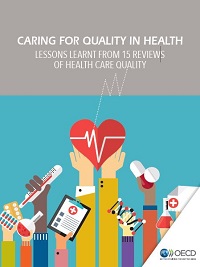Health
Reviews of National Healthcare Quality
|
OECD Healthcare Quality Reviews provide a toolkit to improve the quality of healthcare Over the past four years, the OECD has conducted a series of in-depth reviews of the policies and institutions that underpin the measurement and improvement of healthcare quality in 15 different health systems. Caring for Quality in Health: Lessons learnt from 15 reviews of healthcare quality seeks to answer the question of what caring for quality means for a modern healthcare system by identifying what policies and approaches work best in improving quality of care. Despite differences in healthcare system priorities, and in how quality-improvement tools are designed and applied, a number of common approaches and shared challenges emerged across the 15 OECD Reviews of Healthcare Quality analysed. The most important of these concerns transparency. Governments should encourage, and where appropriate require, health systems and healthcare providers to be open about the effectiveness, safety and patient-centredness of care they provide. More measures of patient outcomes are also needed - especially those reported by patients themselves. These should underpin standards, guidelines, incentives and innovations in service delivery. Greater transparency can lead to optimisation of both quality and efficiency – twin objectives which reinforce, rather than subvert, each other. In practical terms, greater transparency and better performance can be supported by changes in where and how care is delivered; changes in the roles of patients and professionals; and employing tools such as data and incentives more effectively. Key actions in these three areas are set out in the 12 lessons presented in this synthesis report.
|
|
WHY REVIEW HEALTHCARE QUALITY POLICIES?
- OECD countries spent nearly a tenth of their GDP on health. As spending rises, there is pressure to ensure that resources help people live healthier lives
- Most OECD countries have seen increased public interest in ensuring that patients receive care that is safe, effective, and responsive to their needs
- OECD Healthcare Quality and Outcomes indicators show wide variations in quality across OECD countries, yet little is known about the policies that sit behind the numbers
COUNTRY REPORTS AND LESSONS LEARNT
Access the country reports and their press releases when clicking on the links below. Also available on the OECD iLibrary.
- Download the synthesis report Caring for Quality in Health: Lessons learnt from 15 reviews of healthcare quality (released 10 January 2017)
- Australia - November 2015
- Czech Republic - June 2014
- Denmark - April 2013
- Israel - November 2012
- Italy - January 2015
- Japan - August 2015
- Korea - RMarch 2012
- Norway - 2014
- Portugal - May 2015
- Sweden - December 2013
- Turkey - November 2014
- United Kingdom - February 2016
For a description of the health system in these countries and many others, visit the European Observatory's Health Systems in Transition (HiT) series.
FURTHER READING
- Health System Performance Assessment
- Healthcare Quality and Outcomes
- Health Policies
- Health Publications
- Health Working Papers
CONTACT US
- Ms. Katherine de Bienassis: katherine.debienassis@oecd.org
- Ms. Lucie Bryndová: lucie.bryndova@oecd.org
- Ms. Rie Fujisawa: rie.fujisawa@oecd.org
- Generic contact: hcqo.contact@oecd.org
 Follow us on Twitter via @OECD_Social
Follow us on Twitter via @OECD_Social
Related Documents
